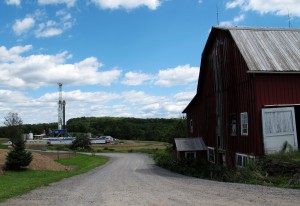First Look At The Senate’s Impact Fee Bill
-
Scott Detrow

Scott Detrow / StateImpact Pennsylvania
The Senate’s impact fee bill increases buffer zones between natural gas wells and water sources
Later today, the Senate Appropriations Committee will hold a preliminary vote on an amendment to SB 1100, which imposes an impact fee on Marcellus Shale natural gas wells.
Except… it currently doesn’t. The amended measure strips out all language pertaining to any impact fee, for the moment.
That’s because those details are still being worked out behind the scenes. For now, the bill addresses the environmental protection components of Governor Corbett’s Marcellus Shale plan.
Here’s the amendment summary, provided by Senate President Pro Tem Joe Scarnati’s office:
• Removes entire fee structure and distribution from the bill.
• The increased environmental safeguards impact unconventional wells and do not impact the
shallow gas industry.
• Increases setbacks from occupied structures and water wells from 200 feet to 500 feet and public drinking water sources to 1,000 feet.
• Increases the setback distance from an unconventional well and a spring or body of water
identified on the most current 7 ½ minute topographic map from 100 feet to 300 feet.
• Provides additional notice of permit applications to adjacent landowners, affected municipalities,
water supply purveyors, severed mineral rights owners from 1,000 feet to 3,000 feet.
• Requires PEMA and the department to adopt emergency regulations directing the operators of
unconventional wells to implement a unique GPS coordinate address for each well at the access
road entrance and well pad site, as well as developing an emergency response plan.
• Authorizing DEP to establish additional protective measures for chemicals or hazardous material
located on drilling site.
• Enhances water quality and quantity replacement standards to meet applicable water quality
standards consistent with the Safe Drinking Water Act.
• Expanding distance and duration of rebuttable presumption to better protect public and private
water supplies from 1,000 feet/6 months to 3,000 feet/12 months
• Requiring disclosure of hydraulic fracturing components.
• Requires the department to adopt regulations regarding the transportation of wastewater.
• Increased well completion report data collection and transparency
• Ensuring qualifications of oil and gas wastewater treatment facility operators
• Posting inspection reports and cleanup activities online
• Increases the civil fine for unconventional wells from $25,000 plus $1,000 for each continuing
day of violation to $75,000 plus $5,000.
• Retains language from SB 1100 regarding a model zoning ordinance.
And here’s the 61-page amendment itself. I’ll highlight the most interesting sections, as I make my way through it.
















